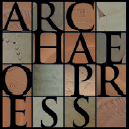
Publishing Scholarly Archaeology since 1997

Download Sample PDF
H 290 x W 205 mm
526 pages
Published Oct 2024
ISBN
Paperback: 9781803279039
Digital: 9781803279046
Keywords
Seal-Impressed vessels; Early Bronze Age; Ḫirbet ez-Zeraqōn; Levant; northeastern Syria; Sealing Practices; Ceramics
The Early Bronze Age Seal-Impressed Vessels from Ḫirbet ez-Zeraqōn
Pot-Sealing Practices in the Levant and Northeastern Syria in the Fourth and Third Millennia BCE
Paperback
£75.00
Includes PDF
PDF eBook
(personal use)
£16.00
PDF eBook
(institutional use)
£105.00
Sealing practices were widespread across the Mediterranean and Southwest Asia from prehistoric to historic times. This study is based on the author’s analysis of the large assemblage of impressed ceramics from the site of Ḫirbet ez-Zeraqōn in northern Jordan.
Contents
Chapter 1: The practice of impressing vessels with seals in the Levant and northeastern Syria in the 4th and 3rd millennia BCE. Geographical setting, chronology, history of research, materials and methods
Chapter 2: Ḫirbet ez-Zeraqōn: an Early Bronze Age site in the northern Jordan Valley
Chapter 3: The seal-impressed pottery from Ḫirbet ez-Zeraqōn
Chapter 4: Southern Levant
Chapter 5: Central Levant
Chapter 6: Northern Levant
Chapter 7: Middle Euphrates
Chapter 8: Jezirah
Chapter 9: Developments of the vessel-sealing phenomenon in the Levant and northeastern Syria in the 4th and 3rd millennia BCE
Chapter 10: Conclusion: features and meaning of the pot-sealing practice
References
Catalogue: Ḫirbet ez-Zeraqōn
Appendix A: Table of Finds – Southern Levant
Appendix B: Table of Finds – Central Levant
Appendix C: Table of Finds – Northern Levant
Appendix D: Table of Finds – Middle Euphrates
Appendix E: Table of Finds – Jezirah
About the Author
Valentina Tumolo gained a PhD in Archaeology at Sapienza University of Rome in Italy, with a dissertation on the Early Bronze Age seal-impressed vessels from the Levant and northeastern Syria, conducted in collaboration with the Eberhard Karls University of Tübingen in Germany. As well as the study of sealing systems and the organisation of craft production, her research interests centre on the dynamics leading to the emergence of complex societies and inequality, particularly focusing on the processes of storage and administration of food staples. Through successful participation in several excavations in Southwest Asia and large multi-disciplinary projects conducted in Italy, Germany, the UK, USA, and Spain, Tumolo has addressed and analysed topics associated with human behaviours in relation to resources exploitation, combining archaeological science techniques with conventional approaches to build coherent and effective narratives.

 Add to wishlist
Add to wishlist
